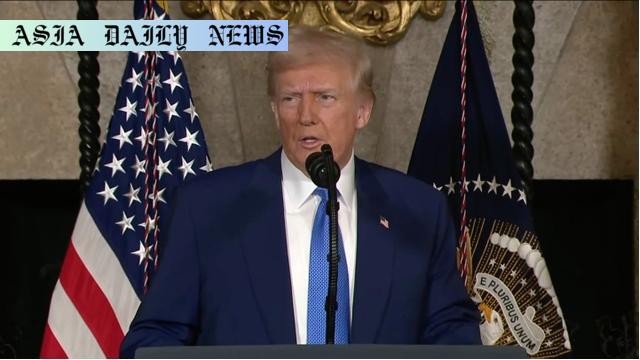Ukraine: Trump more confident of peace deal after US-Russia talks, emphasizing their ongoing efforts but raising Kyiv’s concerns.
Ukraine peace talks gain momentum after US-Russia discussions.
Trump expresses confidence but notes Ukraine’s frustration.
Kyiv missed key talks as potential deals involve reforming elections.
No dates yet set for a potential Trump-Putin meeting on the issue.

Introduction: Renewed Hope for Ukraine Peace
The ongoing war in Ukraine has left the world grappling with both a humanitarian crisis and geopolitical tensions. However, recent updates from U.S. President Donald Trump have instilled renewed hope. Following discussions between U.S. and Russian officials in Riyadh, Trump stated he is ‘much more confident’ about reaching a Ukraine peace deal. This comes at a critical point when both nations agreed on forming dedicated teams to prioritize peace talks, opening significant possibilities for ending the prolonged conflict.
Key Milestone: Riyadh Discussions Raise Optimism
On a diplomatic level, the meeting in Riyadh marks a pivotal milestone. U.S. and Russian top envoys initiated dialogues to reconcile differences, with Trump acknowledging ‘Russia wants to do something’ to move forward. While specific agreements have not yet been disclosed, establishing high-level teams to further this agenda reflects growing momentum. Optimism surrounding a peace deal is a positive sign amidst the bleak backdrop of a prolonged conflict affecting millions.
Kyiv’s Absence: A Missing Stakeholder
Despite the encouraging outlook, Kyiv’s exclusion from these discussions raises key concerns. Ukrainian President Volodymyr Zelenskyy expressed frustration, as the talks significantly impact Ukraine’s future. While some view this approach as pragmatic, excluding primary stakeholders may alienate Ukraine from achieving ownership of a lasting peace deal. This remains a contentious sticking point that could make or break future agreements.
The Role of Elections in Peace Negotiations
Reports suggest that forcing Ukraine to hold new elections may form a critical aspect of the proposed peace deal. Ukraine had delayed elections citing martial law due to the Russian invasion. However, both Trump and other international leaders consider the democratic void as a necessary area for reform. Although Zelenskyy’s legitimacy is under scrutiny by Russia, any electoral changes must carefully balance sovereignty and international pressure to ensure a sustainable outcome.
Potential Trump-Putin Meeting: A Strategic Opportunity
The possibility of a Trump-Putin summit adds another dimension to the narrative. While there is no confirmed date, Trump hinted the meeting may happen ‘probably’ before the month ends. Such engagements historically hold significant sway in resolving complex geopolitical disputes. An outcome-oriented discussion between two of the largest global powers could prove key to materializing a viable peace framework for Ukraine.
Challenges on the Road to Peace
A lasting Ukraine-Russia peace deal faces numerous roadblocks. Beyond geopolitical rivalries, concerns over territorial sovereignty, reparations, and international trust remain at the forefront. Peacebuilding measures must address these foundational issues inclusively while providing safeguards against future escalations. Furthermore, the situation demands balanced international mediation to protect Ukraine’s autonomy without amplifying superpower agendas.
Conclusion: A Moment of Significance
Trump’s optimism regarding Ukraine peace talks signals an important moment. While much remains to be done, the Riyadh discussions mark a step in the right direction. The challenges ahead require not only strong diplomatic negotiation but also ethical responsibility to prioritize the welfare of Ukraine’s people. As talks continue, the international community must remain vigilant to ensure emerging agreements promote lasting peace and stability.



Commentary
The Power of Diplomacy
The renewed hope for peace in Ukraine highlights the powerful role diplomacy can play in resolving international conflicts. The willingness of U.S. and Russian representatives to meet and discuss steps forward is a reminder of how steadfast dialogue can break through even the most entrenched disputes. However, ensuring that all voices, particularly Ukraine’s, are heard will be critical in shaping a resolution that benefits everyone involved.
Kyiv’s Exclusion: A Risky Gamble
One of the most pressing concerns is the apparent exclusion of Ukraine from these initial discussions. While pragmatic in the short term, sidelining the primary stakeholders can lead to long-term discontent and could undermine any agreement. Ukraine must be given agency to shape the outcomes that directly impact its sovereignty and people. Without this, peace may appear superficial and lack the foundational ties necessary to endure.
Can Elections Restore Stability?
The push for elections as part of the peace process remains contentious but not without merit. A new electoral mandate could provide Ukraine with a stronger political grounding. However, such measures should be handled with care, ensuring Ukraine’s independence is not compromised. The international community must support transparency and fairness to empower Ukrainians to chart their future without external coercion.
Final Outlook: A Balancing Act
Trump’s optimism is encouraging, but optimism alone cannot resolve a deeply rooted conflict. Crafting a sustainable peace deal requires a careful balancing act—acknowledging the geopolitical realities, respecting Ukraine’s sovereignty, and addressing humanitarian concerns. If global powers commit to prioritizing these values, the hope for peace in Ukraine might finally be realized.